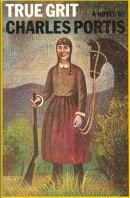 I find out, via Maud Newton, that the Coen brothers have cast the role of Mattie Ross for their upcoming version of True Grit, which is scheduled to be released this Christmas. This is important because the Coens will restore the tale to Mattie’s perspective, the way it was told in Charles Portis’ 1968 novel. In an appreciation of Portis for The Believer (worth reading in full), Ed Park wrote of True Grit:
I find out, via Maud Newton, that the Coen brothers have cast the role of Mattie Ross for their upcoming version of True Grit, which is scheduled to be released this Christmas. This is important because the Coens will restore the tale to Mattie’s perspective, the way it was told in Charles Portis’ 1968 novel. In an appreciation of Portis for The Believer (worth reading in full), Ed Park wrote of True Grit:
The novel . . . could hardly seem more out of step with the countercultural spirit of ’68. Writing in 1928 (i.e., on the eve of the Great Depression), a spinster banker named Mattie Ross revisits the central chapter in her life: the winter of 1873, when, as a fourteen-year-old from Yell County, Arkansas, she hunted down her father’s killer, Tom Chaney, with the help of a tough U.S. marshal that she hires (the “old one-eyed jasper” Rooster Cogburn) and a young Texas Ranger (the cowlicked LaBoeuf). [. . .]
Henry Hathaway’s enjoyable if foreshortened film version (1969) firmly yokes the story to John Wayne, who at sixty-two won his only Oscar for his portrayal of Rooster. Alas, the movie (which also stars Kim Darby as Mattie and Glen Campbell as LaBoeuf) doesn’t capture the retrospective quality of Mattie’s voice, as she fixes on the events over the widening gulf of years (“Time just gets away from us,” she writes, in the book’s penultimate and heartbreaking line). Wayne, in a full-bodied performance, draws the focus away from his employer/charge, so that the title refers far more to Rooster than Mattie.
If you haven’t read True Grit, it, and the rest of Portis’ work, is worth your time.

